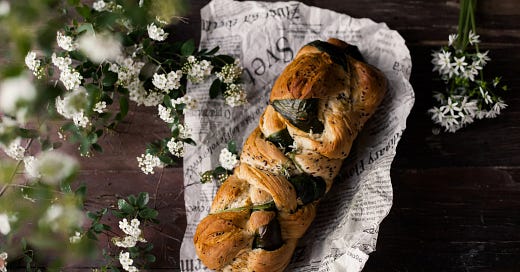This letter is free for you to read, but it wasn’t free for me to create. If you’re interested in reading more letters on Catholic feminism, I would be honored if you would prayerfully consider upgrading your subscription. This publication is only possible because of our generous full subscribers. Full subscribers get access to our entire archive, our summer read along, our monthly booklists, quarterly ask-me-anything sessions, our Advent podcast, and more. Upgrade now and get locked in for five bucks a month before our price increases in January.
One of my favorite follows on Instagram is someone who, at first glance, is kind of ridiculous.
Alexia Delarosa and I could not be more different. She wears these big poofy bows in her hair; she does things like make French fries from potatoes she peels herself; she builds whimsical gnome houses out of pumpkins with her kids. She also bakes these really cool desserts1, including replicas from Disney movies (like Sleeping Beauty’s birthday cake) and pokes fun at herself in a way that I find hilarious. Is she satire? Is she serious? I think it’s a hearty mix of both, and I can’t stop watching.
Because she knows that people on the internet think she’s ridiculous, but it makes her chuckle.
She holds her head at weird angles while she bakes because people kept commenting on it. She shares a sugar cookie recipe looking like a Disney princess and when someone comments “is this satire?!” she responds “no, this is a recipe for sugar cookies.” In a day-in-the-life video, she breezily mentions a post-lobotomy appointment. It’s a form of self-awareness that comes off as authentic and humble to me, and it’s funny.
I’ve always been annoyed by women who live a more stereotypically feminine lifestyle claiming that it pisses the “feminists” off. There’s a smugness that often permeates this corner of the internet, claiming that they love “triggering” the feminists with their love of sourdough and chickens! It really doesn’t bug us, I always want to respond. We don’t give a shit who makes dinner in your home; we give a whole lot of shits that you are safe and have a say in your household and are treated with dignity.
But this account, and others like it, seemed to show that some of the “feminists” were pissed off. They were really, really mad.
The more I saw the comments on her feed, the more difficult it was to understand why, exactly, people were so angry.
“Your smile is creepy AF”
“This woman makes me irrationally angry.”
“Can you please stop?!”
Who cares that this woman is building walnut boats with her kids and digs a princess dress from time to time? The unfollow button is literally right there. Nobody is forcing you to watch this. She wasn’t going off about how her lifestyle is the best, or how working moms are marching straight into hell with their power suits and briefcases. She talks about how she used to be a nanny and loved it, which seemingly affirms that she’s not anti-childcare, and how she used to own a baking business, meaning she has a passion and the skills to craft a business out of it. The most she dives into politics is a complaint about the wokeness of the new Snow White, which elicits more of a who-cares shrug from me than any kind of anger. There are a thousand and one mom influencers that drive me bananas, which I’ve written about, but her intriguing balance of aspiration and self-deprecation make her feed incredibly scrollable.
The reason most people seem to be angry is that her lifestyle seems unattainable. But that isn’t very true. Sure, it requires money to be a stay-at-home parent, but it also requires money to pay for childcare. Many of us could actually do some of the things she does—sing weird good morning songs to our kids, make a lot of crafts, spend an inordinate amount of time decorating our mirror with Halloween ghosts, or baking elaborate breakfasts from scratch. I think the real problem is that some of us don’t want to do those things, and we feel like there’s something wrong with us for that.
But other women aren’t living their lives *at* you.
Just because someone’s doing something you don’t want to do doesn’t mean it’s a personal affront or criticism aimed at your choices and lifestyle.
Our culture asks women to be a thousand and one things. We are to be witty, but not prideful or attention-seeking. We should wield power, but in a delicate, nurturing way. We should be our children’s number one caregiver, but also climb the corporate ladder and be a female voice in the boardroom. We’re then punished for not living up to this stupid ideal we put on ourselves and each other. We are always, always falling short, and always delighted to point out to others where they’re falling short, too.
Feminism, when looked at as this long list of ideals, doesn’t empower us at all. It just gives us a longer list of ways to fail. What we need is something to truly orient our femininity towards—something that we can all aim for while celebrating our different gifts, aptitudes, and delights.
Women living a stereotypically feminine lifestyle are often accused of some sort of internalized sexism. But what if that’s exactly what their angry accusers are experiencing? That can’t be a form of womanhood, because if it is, then I’m a shitty woman. But our femininity has nothing to do with the type of outfits we prefer or whether or not we pay someone to clean our toilets. It has to do with being feminine—a gift given to us by God.
Judith, who beheaded Holofernes, was feminine. Was protecting her people not an act of nurture?
Saint Joan of Arc, who lead the French army into battle, was feminine. Was following God’s will not an act of obedience?
St. Gianna Molla, who was a full-time physician, was feminine. Was using her intellect to care for others not an act of generosity?
There is nothing wrong with you for not wanting to homeschool and make your own butter. There’s also nothing wrong with you for wanting that. There’s something very wrong with either of those parties assigning morality rules where God hasn’t.
In Greta Gerwig’s Little Women—one of my top 3 all-time favorite movies2, for the record—Jo is aghast that Meg would ever want to get married. Why would she chain herself to such a lifestyle? But it’s Meg, whose girlhood flightiness has matured into wisdom, who responds to her: “Just because my dreams are different than yours doesn't mean they’re unimportant.”
I am not going to homeschool my kids or help them build pumpkin gnome houses3.
Alexia Delarosa is not going to write novels.
That doesn’t mean we can’t appreciate one another, learn from one another, and delight in one another’s joy. I’m confident in my version of femininity, which includes a lot of leggings + emails + messy ponytails. She’s confident in hers, which includes twirly dresses + a luxurious skincare routine. We have different dreams—both important, and both feminine.
“Each woman who lives in the light of eternity can fulfill her vocation, no matter if it is in marriage, in a religious order, or in a worldly profession.” - Edith Stein
Feminism is not a competition to get everyone else to live exactly like you do. Demanding other women live up to your worldview’s expectations is exactly what the secular patriarchy would have us do. Treating women like a monolith, as if feminine genius were a prescription instead of a description, robs us of our dignity and is just plain obnoxious.
If there’s someone in your life who’s doing something that isn’t immoral, but just kind of drives you crazy, I’d invite you to stop endlessly bitching about it and instead, just…let it go. See it as an opportunity to love them, and try and ask God what exactly is going on inside you that’s giving you this level of reaction towards it. Anger is typically sadness with no place to go, and sadness can often come from woundedness while pretending it was a gift from someone else. It’s a trickster like that.
Here is the one thing we all have in common, across vocation and age and Pope Francis opinions: we’re all trying really, really hard. We all have values and we’re trying to adhere to them in a world that will chew them up and spit them out faster than you can say fourth-wave feminism. It’s already tricky out here—let’s not make it harder on one another than it needs to be.
On My Nightstand
Wintering by Katherine May: I absolutely loved this memoir of one woman’s quest to “winter” well. One of my goals this year is to learn how to love winter, since I, um, very much don’t. Katherine’s beautiful writing, which touches on ways to incorporate sunlight into your days and the importance of rest, is helping me do so.
Stop Telling Me Humanity is Doomed: Man, I think we all need a good dose of this. “As a belief system, ‘Civilization is doomed because humans are inherently shitty’ is as unscientific as astrology. Most people are good most of the time, the world is steadily getting better as a result, and I can prove it if you give me about ten minutes.”
Liturgical Living Made Accessible: If you’re a parent, you’re probably feeling all kinds of pressure this Advent season. Let it go, friends! Wave it goodbye! Liturgical living isn’t about more stuff, as this lovely piece points out.
In case you missed these Letters:
What We’re Waiting For - for subscribers
Do Your Kids do Santa Claus? - for subscribers
What Would Jesus Say About Our Church Today? - for everyone
Would you consider sharing this newsletter?
Almost 100% of my newsletter growth comes from recommendations from readers. Chances are that if you’ve made it this far, you care about women and the church and know others who would enjoy Letters From a Catholic Feminist. Taking just a few seconds to forward to a friend or share on Instagram/Notes/Facebook/your B-stud’s GroupMe can make a huge difference.
And let’s just admit this, please: if a dad was taking time out of his day to recreate cool desserts from his kids, we’d all be admiring his parenting and it would go viral. A mom does it and it’s a “waste of time”.
If you’re ever in a game of Claire Swinarski trivia, the other two are It’s a Wonderful Life and You’ve Got Mail.
I do, however, want to learn to bake dutch babies…









I really enjoyed this, Claire! It made me think of this passage from Caryll Houselander’s “The Reed of God” where she says “If we had a picture of Our Lady's personality we might be dazzled into thinking that only one sort of person could form Christ in himself, and we should miss the meaning of our own being.” When I (sooo often) find Mary completely un-relatable it’s almost always because I’m projecting all of my perfectionistic ideas and beliefs onto her and completely forget that she was a whole human being with an actual personality and interests and ideas. Like, maybe we even have a lot in common. She also writes “a very great many people still think of Our Lady as someone who would never do anything that we do.” So, I don’t know but maybe some of that trolling of the trad wives online is a way of diffusing the angst we have about all the ways we’re failing to live up to that unattainable standard that isn’t even real. Like you said, assigning morality to things that aren’t actually a moral issue.
This quote is so good: "Anger is typically sadness with no place to go, and sadness can often come from woundedness while pretending it was a gift from someone else. It’s a trickster like that."